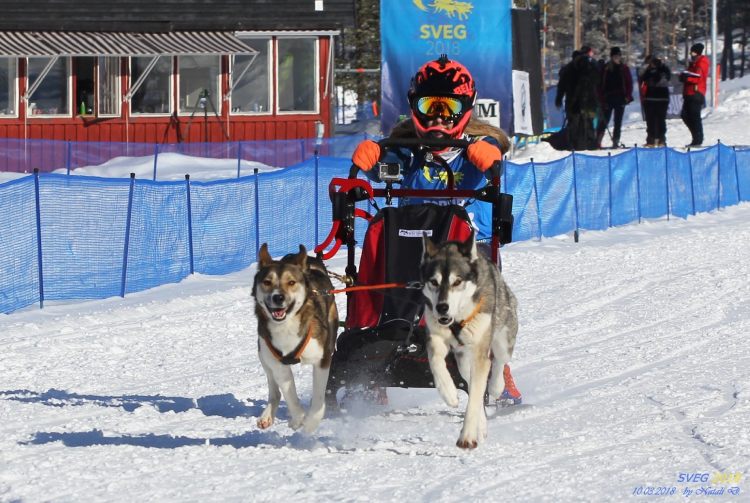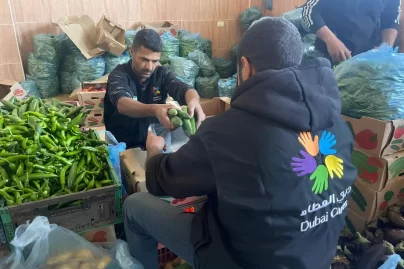Dogs — An integral part of human’s lives as well as sports
Sat 22 Jan 2022
For several, a dog is a man’s best friend. But for some, they’re integral to a competitive sport; welcome to the world of sledge dog racing. In the year 1932, it began as a demonstration sport at the Winter Olympics in Lake Placid, almost 90 years later, the sport is quite alive and barking as dogs pull their harnessed drivers, or mushers, around courses across the globe.
Albeit it is popular in the Arctic regions of North America and Europe, any mention of sledding and the breeds of dogs involved — huskies, malamutes and similar Nordic breeds — always come with the association of snow.
Yet Matt Hodgson, Great Britain’s first world champion in purebred sled dog racing, is living proof that a relative lack of snow is no barrier to success when passion is involved.
Based in the occasionally cold but rarely arctic southeast of England, Hodgson has developed his childhood fascination with dogs of the far north into Infury Dogs — a five-time medal-winning sled dog team.
Hodgson cites Jack London’s 1903 novel The Call of the Wild as one of his earliest influences, an interest that quickly turned to love with the arrival of his first dog, Ranger — an Alaskan Malamute puppy — in 2005.
These days Hodgson runs with his pack of six “Deadly Sins” — all dogs taking their name from one of the seven biblical vices.
It is an etymology that seems extremely harsh given their impeccable training and talent, not to mention their cuteness — compounded by the arrival of two adorable Greenland Dog pups, Nimis (gluttony) and Pride, in February last year.
Yet there is a method to the madness, Hodgson explains. Having intended to call his first sled dog — assumed to be female — Envy, Hodgson was forced to rethink when his Canadian Eskimo Dog was born male.
Invidia, the Latin origin of ‘envy,’ was the replacement name of choice and subsequently set a trend, though Hodgson assures that “they’re my ‘deadly sins,’ rather than being deadly sins.”
No rest for the wicked then, as training begins from puppyhood.
“First of all, they’re my pets, so they’ve got to be good dogs all around,” Hodgson said, with all dogs attending puppy classes to nurture good behaviour and sociability, laying the groundwork for sledging further down the line.
Training is gradually built up over a two-year period — after half a year, pups are allowed to run loose alongside the adults before being “hooked up” towards the ends of runs a few months later to get a feel for the harness.
A gradual build-up is crucial and each dog varies, Hodgson said, but within a year dogs can begin club level competition. Between 15 and 18 months, the international level beckons.
Members of the public trekking through the forests of East Sussex at unsociable hours may be lucky enough to catch the Infury Dogs racing past on one of these sessions, with Hodgson having a permit to run on Forestry England land at certain times — typically at less busy periods — in order to fulfil his impressive five to six days of training per week.
You may hear shouts of “Haw!” and “Gee!” as the dogs turn left and right, as Hodgson, with no reins or any physical connection to the pack, must rely on verbal commands alone, taught through constant reinforcement.
If you’re very lucky, you may even catch Hodgson “wrapped around a tree” when the dogs catch sight of a streaking rabbit or deer.
“Most of the time, they listen,” Hodgson laughs. “That’s all part of the fact that you’re running with animals rather than a machine.”
In competition, though, the Infury Dogs are very much machines.
Hodgson — who tends to compete in “short” races of up to eight kilometres (almost five miles), depending on terrain — has amassed five medals for Great Britain since his first international outing in 2015.
His crowning moment came in 2019 when Infury’s relatively inexperienced team soared to victory at the UK’s maiden World Championships — becoming Team GB’s first-ever world champion in purebred sled dog racing.
Yet for Hodgson, self-proclaimed “consistently last” for his early international outings, winning has never been the absolute priority.
Though disrupted by the pandemic — with a December trip to Belgium canceled following the Covid surge of the Omicron variant — the sport has taken Hodgson and his dogs around the world.
Travel restrictions willing, Sweden calls for the World Championships in March, with the tantalizing prospect of competing at the Östersund Ski Stadium in Östersund.
“I love the dogs and the dogs take so much pleasure from it — if they didn’t enjoy it, they wouldn’t run and it wouldn’t be a lot of fun,” Hodgson said.
“I like the camaraderie, I like the social elements, and I love sharing my love of dogs with people who also have a love of dogs, so it’s a coming together of different people. It’s nice to do well, but that’s not the main thing.”
Now, 10 years shy of the 100th anniversary of sled dog racing at the Winter Olympics as a demonstration sport, talk continues to swirl of the sport one day making a return to the Games.
Hodgson said the International Federation of Sled Dog Sports (IFSS) has been petitioning the International Olympic Committee (IOC), but he holds his own reservations on the suitability of the sport for Olympic status — fearing a “can of worms” opened up by logistics, finances and the very nature of the sport.
“Trying to take tons of dogs and travel from North America or somewhere around the world, it’s so expensive and there’s no money in it,” Hodgson said.
“There’s so many distances, so many categories — which do you select? Is it going to be teams of huskies or teams of greyhound crosses? What distances are they going to run? Does it reflect the sport?”
“Then there’s the issue of, ‘Is the Olympics about human sport? Is this actually human athletics?'” Hodgson added referencing the long-running “furor” around equestrian sports at the Games.
Yet theoretically given the chance to compete in “his version” of the sport, Hodgson would “absolutely love” to represent GB at a Games.
Until then, it’s racing through forests — and the occasional tree — in East Sussex for Hodgson and his “Deadly Sins.”
Source: Agencies

 Apr 19 2024
Apr 19 2024













